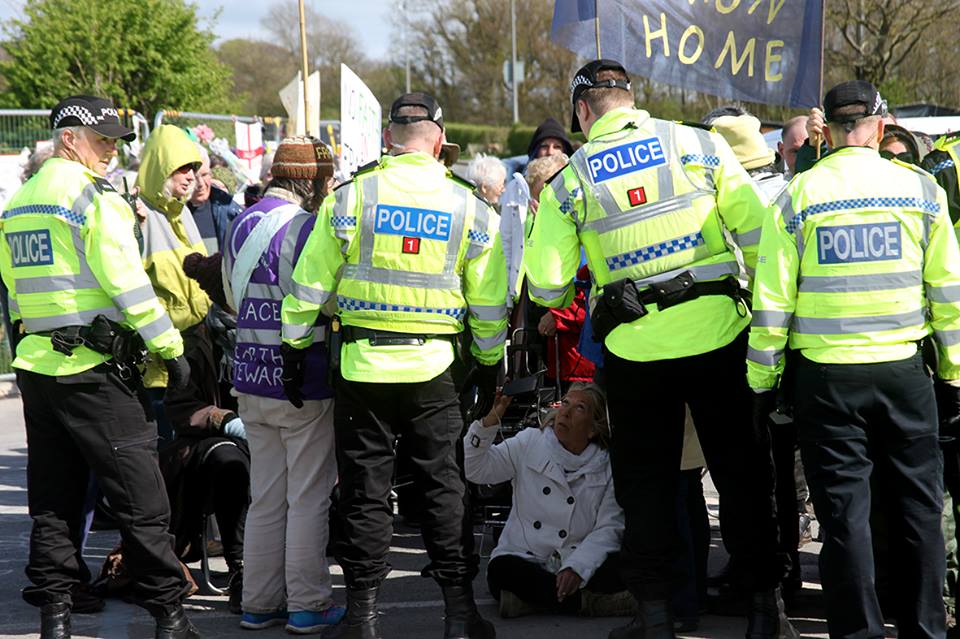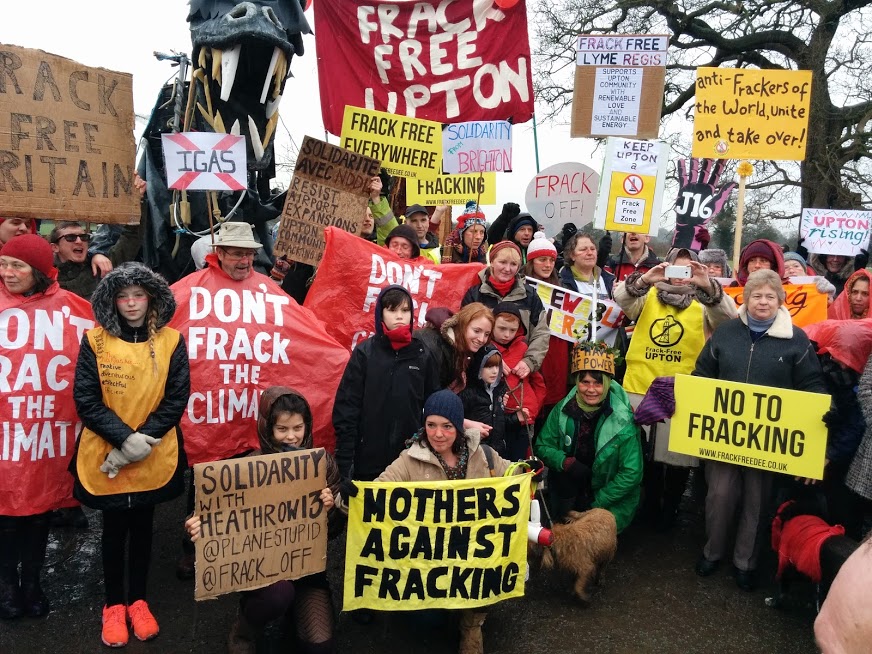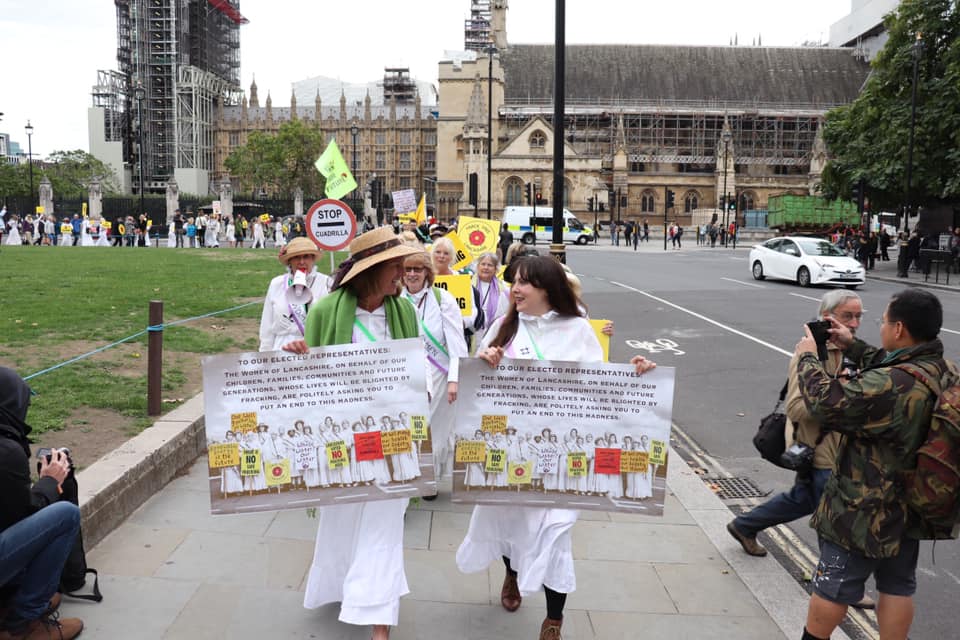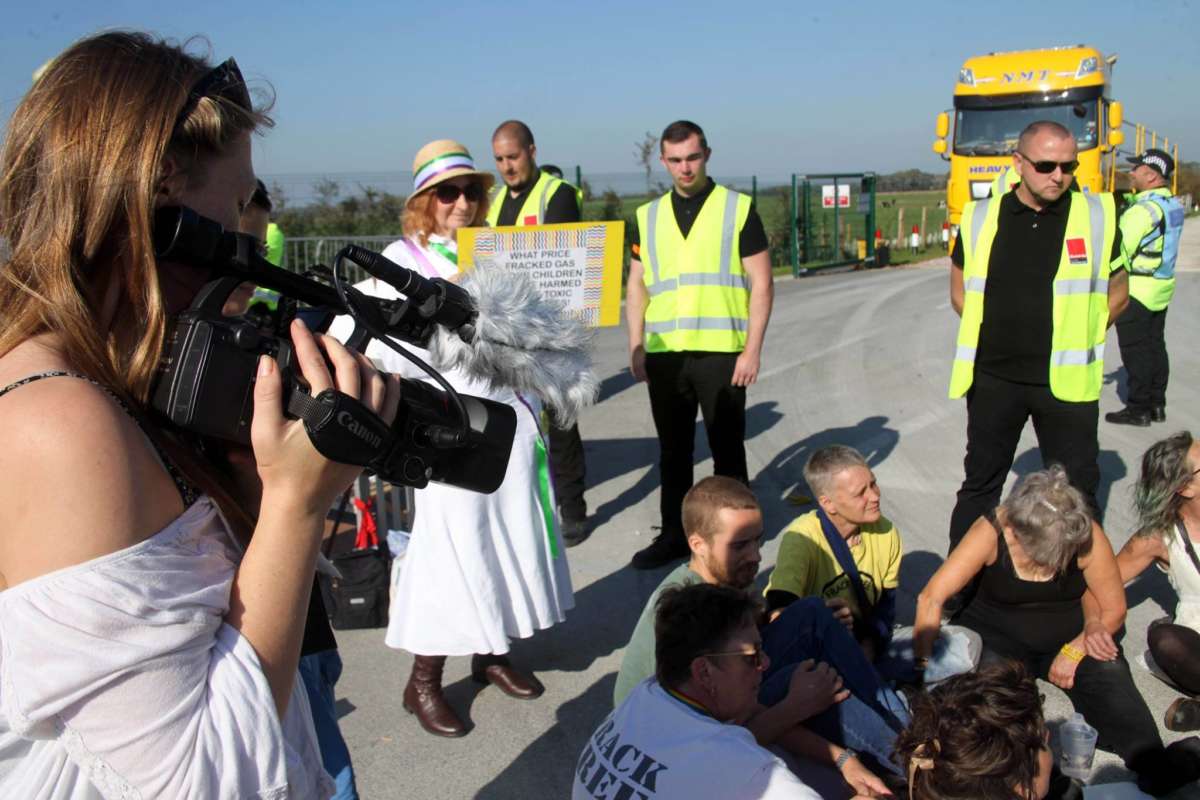Britain will soon see the first license to drill for shale gas issued since 2019, when the practice was banned following a Magnitude 2.9 tremor at a fracking test well near Blackpool in Lancashire.
Overturning Britain’s ban on fracking was one of the first initiatives announced this month by the incoming government under Tory leader Liz Truss. It belongs to a package of demand-and-supply interventions aimed at addressing the high price of gas.
The message from Downing Street is clear: This government will not seek to lessen the hold of fossil fuel corporations over citizens’ lives by transitioning from hydrocarbons through efficiency measures (such as building insulation), rapidly ramping up renewables, and a further windfall tax on the oil and gas industry. Instead, it will arrange payment of the full-market price for gas to the energy firms while subsidizing consumer and business bills, particularly for rich, energy-profligate households. The cost, estimated at £150 billion, will be loaded onto future taxpayers and energy consumers. It is the largest single act of U.K. state intervention outside wartime.
Given Truss’s market-fundamentalist instincts, this cannot have been easy. But she has coupled it with a laissez-faire thrust on the supply side: to tear up red tape and issue licenses to drill. The market, she believes, will resolve its problems as new supply brings prices back down.
The focus is North Sea oil, but fracking is part of the program. Fracking also offers the incoming government an opportunity to throw red meat to Tory Party members and the right-wing Daily Mail tabloid. To reactionaries, Truss’s move signals that her government intends to bash the tree-huggers, goad them into setting up camps at fracking sites where the security forces will persecute and ultimately defeat them, much as Lady Thatcher did to the feminists who peace-camped at Greenham Common.
The government’s rationale for fracking, then, has an economic and a political edge. Will either succeed?
On the economic side, the prospects are sufficiently enticing to have sent the shares of some fracking companies soaring, notably Union Jack Oil. (Its very name sets Tory hearts aflutter.) Some pundits are predicting a great British gas rush. Shale extraction, claims the Daily Mail, may begin slowly, but by 2037 could “eclipse” fossil gas output from North Sea wells. At the wilder end are predictions that Britain will enjoy a U.S.-style shale revolution, contributing to lower global prices and securing mega profits for the fossil fuel sector.
The sober truth is that estimates of the fossil gas trapped beneath Britain’s moors and available for profitable extraction are uncertain. They vary dramatically. One report by the British Geological Survey (BGS) in 2013 estimated that the biggest region, Bowland-Hodder, could contain as much as 2,285 trillion cubic feet. A more recent BGS analysis revises the figure down to 200 trillion cubic feet. The Daily Mail’s projection is based on one of four scenarios laid out in a publication by the National Grid; it casually neglects to mention the other three — all of which envisage fracking as supplying less than one-tenth of Britain’s gas consumption by mid-century.
Whatever the quantity of fossil gas, its profitable extraction will require political action. Fracking companies are lobbying the Truss government to trim and rescind regulations on planning, on earthquakes (in particular the requirement that operations be paused when they trigger a Magnitude 0.5 tremor), and on rules that require local communities to give consent. The latter, according to one consultancy, “amounts to a moratorium for delivery.”
We can expect to see regulations go by the wayside on account of the fracking lobby’s efforts. Truss’s cabinet is based around the “drill baby drill” faction of the Tory Party. Its strategy is to fabricate a “Ukraine War moment” in order to advance fossil-fuel agendas and take an axe to environmental regulations. The cabinet includes Ranil Jayawardena, as environment secretary, who has consistently voted against measures to combat climate change and against government support for renewable energy projects.

Home Secretary Suella (“Cruella”) Braverman, meanwhile, has called for Britain’s net zero emissions target to be suspended. Crucially, the business and energy portfolio was handed to Jacob Rees-Mogg, a climate denier and investor in fossil fuel industries who champions the continued burning of coal and yearns to stamp out “the environmentalist obsession,” evident in his lust to squeeze “every last cubic inch of gas” from beneath the North Sea. Shale gas, viewed through Rees-Mogg’s monocle, is “very clean.”
The new premier herself, Liz Truss, used to work as a commercial manager for Shell, and her Tory leadership campaign was partly funded by beneficiaries of the political funding program of that other British-based oil giant, BP. When environment secretary in 2014-16, she slashed subsidies for solar farms, calling them a blight on the landscape. She has pledged to suspend the so-called “green levies” on energy bills (earmarked for investment in renewables), and she hired an aide whose previous position was at the Cato Institute, a U.S. “climate denial front group.”
On her U.S. tour four years ago when chief secretary to the Treasury, Truss met with a succession of Koch-funded think tanks and lobby groups with a history of climate science denial, including the Cato Institute, the American Enterprise Institute and the Heritage Foundation.
The U.S., for Britain’s frackers, is the shining light, both in the profitability of its shale gas industry and in the Trumpian mode of flatly refusing obvious truths. Jim Ratcliffe, one of Britain’s richest men and the owner of the chemical giant INEOS, the country’s largest privately owned company, defends fracking by pointing to “America” where they have “drilled a million wells and it’s been very successful, they’re not polluting things.” His spokespeople promise — fingers crossed behind their backs — that INEOS would frack “safely and without harm to the environment.”
In reality, fracking would absolutely trash the environment, not only locally through vehicle traffic at drilling sites, water contamination, and so on, but also globally through the CO2 emissions from its combustion and also from the direct escape of methane — an extremely potent greenhouse gas.
The methane leaking from Permian oil and gas wells in Texas and New Mexico alone, reports New Scientist, will accelerate global heating “by almost as much as the carbon dioxide released by all homes in the US annually.” The idea pushed out by the gas giants’ PR departments, and parroted by Truss and by Joe Biden too, that methane is a “transition” or “bridge” fuel — a stepping stone from a carbon-black past to a green-energy future — is risible.

The “bridge fuel” myth has a political purpose beyond simply sanitizing a greenhouse gas. The fracker faction that sets the tone in Truss’s cabinet must work alongside ambivalent or skeptical colleagues, such as the chancellor, Kwasi Kwarteng, and the junior minister for climate change, Graham Stuart. And they must try to persuade a skeptical public, half of whom oppose fracking (against a quarter in favor).
Painting shale gas as “clean” is important for bridging these divides, and is ideologically central to their broader cause. Politically central will be the bribing of residents in fracking localities, with the aim of turning them against their anti-fracking neighbors. The director of INEOS has made the ambiguously phrased promise “to invest the first 6 per cent of the value of the gas back into the local communities.” Also under discussion is a proposal to subsidize 25 percent of energy bills for residents living near fracking sites, for an unspecified time period. Dangling that carrot at a time of unaffordable energy bills in a run-down town like Blackpool is a cynical move, says Tina Rothery of Frack Free Nanas — a singing, dancing protest group of mums and grandmothers.
How will the anti-fracking movement respond? Campaigners in Lancashire, Rothery tells Truthout, are preparing to “pull out all the stops” and “getting straight back into gear. We’re rebuilding our networks right now, and this week we’ll be gathering at the gates. We’re going to use every tool available — protest camps, blockades, demonstrations and legal action — to stop them going ahead. We’re going to set up the camp again; we’ll be everywhere.”
The advantage campaigners have, Rothery says, is that they’re not building a movement from scratch but reviving an earlier successful one. “We were huge in the mid-2010s, with around 400 groups. We protested here at the camp for 1,000 days until fracking was banned, and our direct action was the inspiration behind Extinction Rebellion. We were helped along by friends abroad, especially in the U.S. — we learned from one another and we’ll need that solidarity again.”
Another difference between today and 2011 (when the original campaign began), relates Clara Paillard of the Public and Commercial Services union and Frack Free Lancashire, is that “now the biggest union, UNITE, has an anti-fracking policy. Plus, there are lots of new social movements on environmental questions, such as Extinction Rebellion, the Youth Strikes for Climate and Just Stop Oil, and on the energy-costs crisis, such as Enough Is Enough and Don’t Pay.”
This summer, in addition, has seen a revival of labor militancy. “So there’s the potential for bringing together a coalition of community groups, climate groups, trade unions and others,” Paillard tells Truthout. “In this the anti-fracking groups can play a key role, as we don’t include only the direct-action people who can get arrested, we’re also the local residents and community groups.”

However, Paillard warns, “the threat greater than fracking is North Sea oil and gas drilling. Anti-fracking must be part of the bigger campaign, not a distraction.”
Rothery and Paillard and the fracktivists believe they’ll win. Their confidence rests in part on the obstacles facing the government. The new prime minister idolizes Margaret Thatcher, but her party is riven and her government may well flounder.
Thatcher, during a decade of semi-successful GDP growth, rammed through reforms that could draw strength from their alignment with an emergent global accumulation regime. Her party cohered around the neoliberal agenda, including energy privatization, to which opposition parties later acceded.
Under Truss’s premiership, by contrast, no new growth model is in view. Brexit has been a lame duck, not a golden goose. An unpopular leader, she gained the votes of fewer than a third of her party’s members of parliament (MPs) and less than half its membership — in a two-horse race. On fracking, she’ll find some support among Tory MPs and voters, but she’ll find griping and grumbling, too. Ripping up planning regulations is unpopular among Tories of a NIMBY persuasion.
If the fractivists win this battle, it’ll be a minor skirmish in a planet-defining war. Oil and gas firms are sinking colossal sums into exploration and expansion. The U.S. government, beginning in summer 2021 and accelerating with the Ukraine war, has steered a U-turn on the auctioning of oil leases on public lands. As if to gaslight environmentalists, the Biden-Manchin climate bill fires the starting pistol for a new circuit of drilling and fracking. In view of Washington’s hegemonic position and London’s role as current president of the Conference of the Parties on climate, these policy shifts lend legitimacy to fossil fuel expansion worldwide.

The U-turns on fracking in London and Washington expose as a delusion the idea that the long arc of capital bends toward sustainability. Economic trends will not come to rescue Earth. When oil and gas prices plummeted in 2015, some hoped that the fracking industry would bite the dust. When they rebounded in 2021, the new faith was that this will expedite the energy transition, as renewables become cheaper (relatively) by the day. Yet capital does not follow this logic. Even when it sniffs adequate returns, the Chartist Thomas Dunning wrote in 1860, capital can be “very bold,” but when profits are high it will be prepared to “trample on all human laws,” including the mass enslavement of human beings in his day, and environmental ruination in ours.
Renewed investments in oil and gas will make a target even of “net zero” — let alone absolute zero — even harder to reach. The current fever for drilling and fracking is fixing new masses of capital: in wells that will yield shale gas for 10 or 20 years and in LNG terminals that take decades to repay their investors. Their owners are sure to fight tooth and nail to defend their assets.

As recession squeezes global demand over the next year or two, and later as the new production comes on stream, gas and oil will likely become affordable again, but only until the next price spike, and the cycle continues. Meanwhile, some of the trillions of dollars gushing into oil-industrial coffers will be earmarked for waging the ideas war against environmentalism, for purchasing politicians and for swaying policies. This cycle threatens to ensure the continuation of the catastrophic trajectory we are presently on, unless and until rebellions break out to stop it.
Join us in defending the truth before it’s too late
The future of independent journalism is uncertain, and the consequences of losing it are too grave to ignore. To ensure Truthout remains safe, strong, and free, we need to raise $31,000 in the next 48 hours. Every dollar raised goes directly toward the costs of producing news you can trust.
Please give what you can — because by supporting us with a tax-deductible donation, you’re not just preserving a source of news, you’re helping to safeguard what’s left of our democracy.
